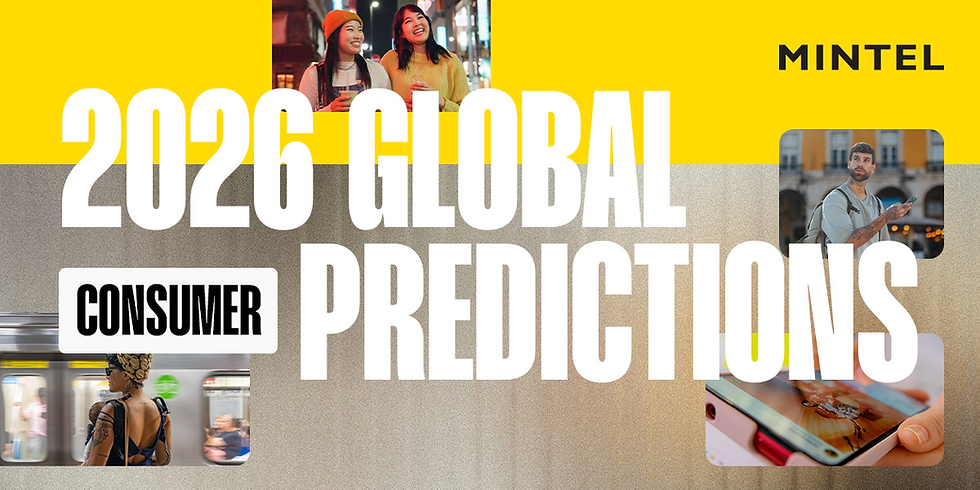Insight of the Day: Prestige Beauty Continues to Outpace Mass in Circana’s Nine-month 2024 Results
- InsightTrendsWorld

- Nov 19, 2024
- 3 min read
Key Findings
Prestige Beauty Outperforming Mass Market:
Prestige beauty grew 7% in the first nine months of 2024, compared to 2% growth in the mass market.
Fragrance Leads the Way:
Fragrance grew 14% in prestige and 2% in mass.
Growth in prestige fragrance is driven by lower-priced offerings like minis and body sprays, which began trending in 2023.
Prestige Haircare Surges:
Prestige haircare grew 9%, compared to 2% in mass, driven by trends in scalp care, hair loss treatments, and styling products.
Skin Care Democratization:
Skin care grew 3% in prestige and 2% in mass.
Consumers are balancing between higher-priced mass options and lower-priced prestige products, prioritizing efficacy.
Makeup Divergence:
Prestige makeup grew 5%, while mass-market makeup fell 3%.
Lip cosmetics remain the standout across both categories, growing 8% in mass and driving impulse purchases.
Brick-and-Mortar Dominates Prestige Sales:
Prestige beauty continues to thrive in physical retail due to the ability to test products.
Mass beauty sees faster e-commerce growth due to convenience and variety.
Holiday Season Outlook:
29% of consumers plan to gift beauty products, up from 2023.
This rises to 41% among households with children.
Key Takeaway
Prestige beauty continues to dominate the market, leveraging physical retail experiences, product innovation, and consumer interest in high-efficacy, lower-priced offerings.
Trend
"Prestige Democratization and Category Leadership in Beauty."
Consumer Motivation
Desire for high-efficacy products at accessible price points.
Impulse purchases in lip cosmetics.
Gifting culture driving holiday beauty sales.
What Is Driving the Trend?
Prestige brands offering lower-priced products to capture broader audiences.
Increasing consumer interest in efficacy and quality.
Physical retail providing an edge with testing opportunities.
Who Are the People?
Prestige Consumers: Interested in high-quality products with perceived luxury but accessible price points (e.g., minis, body sprays).
Mass Consumers: Opting for higher-priced mass-market options with a focus on efficacy.
Gift Buyers: Motivated by beauty's appeal as a thoughtful and luxurious gift.
Description of Consumers
Age Range: 18-45+
Behavior: Prioritize quality, efficacy, and the ability to test products in-store. Holiday shoppers are drawn to beauty as a giftable category.
Conclusions
Fragrance and haircare are key drivers of prestige beauty's growth, particularly through accessible formats.
Skin care bridges mass and prestige markets through efficacy-focused options.
Brick-and-mortar remains critical for prestige brands, while mass brands excel in e-commerce.
Implications for Brands
Focus on Accessibility: Offer lower-priced, prestige-quality products to capture wider audiences.
Enhance Physical Retail: Leverage in-store testing and unique experiences to drive purchases.
Innovate in Lip Products: Capitalize on the impulse-buy nature of lip cosmetics.
Implications for Society
Growing accessibility in prestige beauty reflects a shift toward democratizing luxury.
Beauty continues to be a gifting staple during the holiday season.
Implications for Consumers
Greater access to affordable luxury options.
Ability to prioritize efficacy across mass and prestige categories.
Implications for the Future
Prestige beauty will increasingly cater to middle-market consumers with accessible options.
Brick-and-mortar will remain pivotal for prestige growth, while e-commerce leads in mass beauty.
Consumer Trend
Affordable Luxury and Experiential Retail.
Consumer Sub-Trend
Impulse Purchases in Lip Cosmetics.
Big Social Trend
Democratization of Prestige Beauty.
Local Trend
Increased holiday beauty gifting in households with children.
Worldwide Social Trend
Global interest in efficacy-driven beauty products at accessible price points.
Name of Big Trend Implied
"Prestige for the People."
Name of Big Social Trend Implied
"Accessible Luxury in Beauty."
Social Drive
The growing convergence of quality, affordability, and experience drives the prestige beauty trend.
Learnings for Companies to Use in 2025
Target New Audiences: Use accessible price points and smaller formats to attract younger and middle-market consumers.
Focus on Key Categories: Prioritize growth in fragrances, lip products, and scalp/hair treatments.
Leverage Brick-and-Mortar: Enhance in-store testing experiences to maintain the prestige edge.
Strategy Recommendations for Companies to Follow in 2025
Expand Affordable Lines: Launch travel-size or entry-level prestige products to democratize luxury.
Enhance Retail Experiences: Invest in physical retail for prestige beauty, emphasizing product testing and personalized consultations.
Double Down on Gifting: Market beauty as the go-to holiday gift with bundles and themed promotions.
Final Sentence (Key Concept)
The growth of prestige beauty is driven by accessible luxury, experiential retail, and innovation in fragrances and lip products, solidifying its dominance over the mass market.
What Brands Should Do in 2025
To benefit from the trend:
How: Expand affordable, high-quality offerings, enhance in-store experiences, and promote gifting-focused campaigns to capture evolving consumer preferences.





Comments